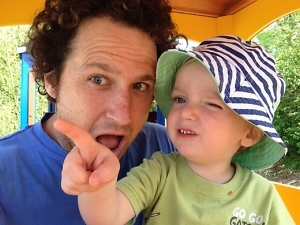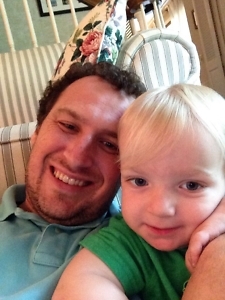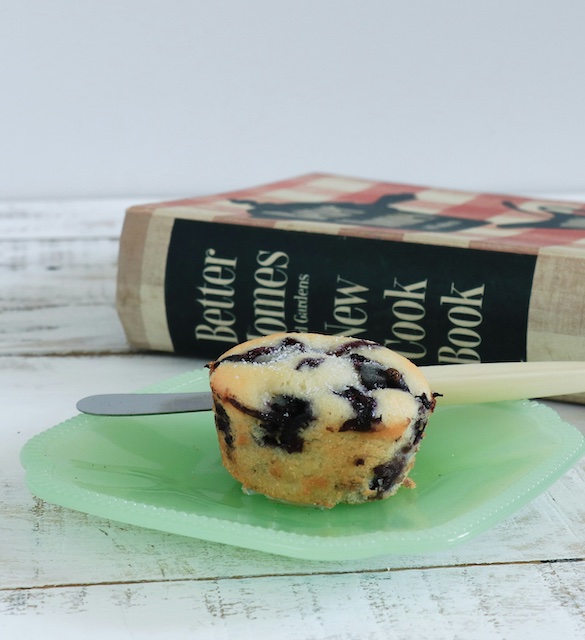Making a Mess With Words
I’ve learned a lot while reading with my son
The noises — Brmmm Brmmm, Vroom Vroom, Whoosh Whoosh — lured him to my lap. On the floor, with my toddler son, I read Emma Garcia’s Toot Toot Beep Beep. “More, more,” he yelled. I got louder and sillier as he mimicked noises — Honk Honk, Chugga Chugga.
 Until we discovered Garcia, my attempts at reading to Henry lasted a few pages before he gnawed or hurled the book. But Toot Toot Beep Beep, a lucky find at the library, held his attention to the last page. We read it three times before he wandered to the corner. While he fiddled with a toy, I glanced at the cover and then back at him as a warm feeling spread in my chest.
Until we discovered Garcia, my attempts at reading to Henry lasted a few pages before he gnawed or hurled the book. But Toot Toot Beep Beep, a lucky find at the library, held his attention to the last page. We read it three times before he wandered to the corner. While he fiddled with a toy, I glanced at the cover and then back at him as a warm feeling spread in my chest.
Toot Toot Beep Beep led to Tap Tap Bang Bang, which led to Tip Tip Dig Dig. Henry was clearly an Emma Garcia fan, so I drove to our local bookseller, Parnassus Books, and asked the manager to order copies.
“Do you want the chewables?” he asked.
“What?” I said.
“That’s what I call the board books.”
I laughed. “Yes, give me three chewables.”
Every morning we read the “chewables,” always looking forward to the surprises on the last page: a go-go-go kart or an adventure playground or cars slumbering in a garage. Soon my book-eating toddler transformed into a page-turning toddler, pointing at pictures and making sounds. Instead of being mangled by bite marks, the corners became worn from our fingers.
Henry’s love of Garcia’s books inspired me to take him to weekly story time at Nashville’s Main Library. While Mary Mary and Library Pete read to the fidgeting crowd, I put away my smartphone and listened to the sounds of the stories. The rhymes in Chicka Chicka Boom Boom loosened my tongue, encouraging me to enjoy the rhythm. The quiet storytelling in Little Bear’s Boat reminded me how I love a hushed and tender tone. The silly sounds in Truck Full of Ducks filled me with a light feeling and a desire to play with words. A switch was flipped on inside me.
Paying attention to the sounds influenced my reading and writing. I studied how my favorite authors make music with their words, while looking for opportunities in my writing to create sound. I read poetry (something I had never considered) and attended a free workshop at the library. “Get messy with words,” said the instructor. For the first time, I played with language like a jungle gym.
 It dawned on me that I have neglected words. I’ve treated them as a means to an end, nothing more, throwing them together to make sentences, often in crude ways. In school, I made sure my subject and verb agreed, but that was the limit of my care. Never did I consider I might lose my words or find myself in a situation where familiar words no longer serve me. “Words are like water,” writes Katherine Paterson, “which gives life and growth and refreshment, but because it has always been abundant, we treat it cheaply. We waste it and pollute it and doctor it.” Looking back, I wonder how I so easily ignored and wasted words. I don’t want to spend the second half of my life oblivious to one of the deepest parts of myself.
It dawned on me that I have neglected words. I’ve treated them as a means to an end, nothing more, throwing them together to make sentences, often in crude ways. In school, I made sure my subject and verb agreed, but that was the limit of my care. Never did I consider I might lose my words or find myself in a situation where familiar words no longer serve me. “Words are like water,” writes Katherine Paterson, “which gives life and growth and refreshment, but because it has always been abundant, we treat it cheaply. We waste it and pollute it and doctor it.” Looking back, I wonder how I so easily ignored and wasted words. I don’t want to spend the second half of my life oblivious to one of the deepest parts of myself.
That realization is just one of the lessons Henry led me to. Reading with a child, I’ve discovered, is a continual learning experience for everyone involved. In October, we read Rebecca Green’s How to Make Friends with a Ghost. Through her character, Dr. Phantoneus Spookel, “a leading ghost expert,” Green provides playful instructions to care for a ghost. Henry loves Dr. Spookel’s advice to feed ghosts “cinnamon-dusted insects” and “bootons” and “pickled boogers.” When I ask him what he wants for lunch, he often responds with one of these, emphasizing every syllable. Not only does he love the instructions, but he studies the drawings and asks a million questions — and dear reader, if you need a dose of humility, I recommend explaining an abstract concept like a ghost to a small child.
As Henry gets older and his interests change, we’re creating a collection of favorites, our own little family canon. All was going well until the superheroes invaded. Batman, Superman, and Iron Man dominated reading time with their flashy costumes and gadgets. My wife and I tried to hide our dislike of these books; the most annoying part was explaining the fighting and bad guys. After reading them a hundred times, I slid the superheroes under the coffee table and couch, hoping to nudge our son back to our beloved books — Dragons Love Tacos and Goodnight, Goodnight, Construction Site — but the kid always found the superheroes. When he noticed those titles at the library, my wife and I conspired to tell him they were “reference” books that could not leave the building. He could look all he wanted, but they were not coming home.
It was a brilliant parenting move while the lie lasted.
One afternoon at our neighborhood library branch, Henry overheard another boy ask his mother if he could check out a Batman book. Henry turned around in his chair (there is no shy bone in his body) and explained why they couldn’t take it home. The boy glanced at his mom, and the mom looked at me with a furrowed brow. I smiled and nodded. We watched the boy walk to the counter, scan the book, and leave with it tucked under his arm. Henry whipped around in his chair with rapid-fire questions for me. I shrugged my shoulders and played dumb. But this did not satisfy him.
He marched to the librarian’s desk. Standing a few feet behind him, I listened as he asked if the superhero books were “reference” books. The young librarian grinned and made eye contact with me, looking for a cue. But I said nothing, grinning back. “No, they are not reference books.” she said. “They’re fun books you can read at home.” I felt my lie crumble, knowing there was nothing I could do; the librarian had spoken. Henry threw his hands in the air and spun around yelling, “Daddy, it’s not a reference book. We can get the Aquaman book.” He ran to the shelf with a victorious grin.
Consider this a lesson in the foolishness of trying to control your children. I’m learning to read whatever Henry brings from the shelf, and I’m grateful he is hearing a wide variety of words, even from the superheroes. Reading with a child is digging with bare hands in rich soil, planting a seed. We pour words, trusting in their nutrients, hoping they create promise. And in the nurturing, through our innate desire to aid growth, we remember how marvelous our capacity for language is. We access one of the deepest and mysterious parts of our humanity, the ability to name the world around us while expressing our thoughts and feelings.

Copyright (c) 2019 by Billy Kilgore. All rights reserved. Billy Kilgore is a writer, at-home dad, and ordained pastor. He lives with his wife and two sons in Nashville. His writing has appeared in The Washington Post‘s “On Parenting” column, Narratively, Scary Mommy, and Fatherly. He is a graduate of the University of Tennessee at Chattanooga.


